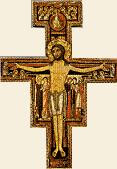 We say this because all of the Franciscan's work and all his love will be directed to God, since he sees Christ Himself in his brethren. Hence his apostolate draws him deeper into the contemplative life, and he daily grows closer and closer to the one goal of all souls – union with God by love. It is well to note that when the contemplative life becomes rather difficult in the midst of external activity, it is best and often necessary, to observe days of recollection, in order to foster a greater union with God.
We say this because all of the Franciscan's work and all his love will be directed to God, since he sees Christ Himself in his brethren. Hence his apostolate draws him deeper into the contemplative life, and he daily grows closer and closer to the one goal of all souls – union with God by love. It is well to note that when the contemplative life becomes rather difficult in the midst of external activity, it is best and often necessary, to observe days of recollection, in order to foster a greater union with God.It is also beneficial to establish retreat houses where the Franciscans, over a protracted period of time, may be able to replenish the spiritual energy that they have expended in the Apostolate. Bypassing such periods in recollection, we are following the example of our Seraphic Father, who often retired to Mt. Alvernia or other suitable places for this same purpose. There, after the arduous task of preaching to the laity, he found a safe refuge where he could speak, undisturbed, with God.













